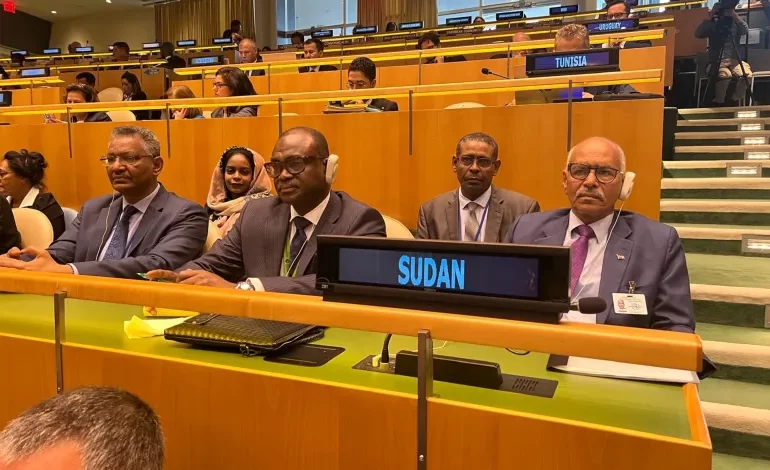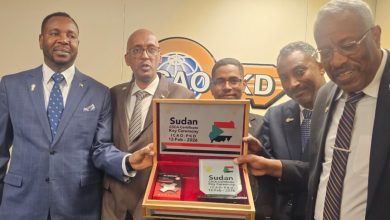Will “Sudan Week in New York” Open a Path to Solving the Crisis?

Al-Nour Ahmed Al-Nour
On the sidelines of the new session of the United Nations General Assembly, New York is witnessing several activities related to the Sudanese crisis. These include consultations between international and regional parties, and meetings involving the President of the Sovereign Council and Commander of the Army, Abdel Fattah al-Burhan, with Western, African, and Arab leaders and officials. According to observers, these meetings are expected to offer a glimmer of hope for ending the war, which has raged for nearly 17 months.
Consultations and Understandings:
The U.S. administration is organizing meetings on Tuesday regarding Sudan, with U.S. Secretary of State Antony Blinken and his counterparts from Arab, African, and Western countries, to discuss the humanitarian situation and push for a new round of negotiations between the Sudanese parties. Blinken is also expected to hold consultations with al-Burhan, following the failure of a Sudanese-American meeting in Jeddah and a similar stalled meeting in Cairo, after the Sudanese government refused to participate in a conference in the Swiss Alps. This conference, held between the warring parties, concluded on August 24 with understandings regarding humanitarian aid.
International and regional parties have formed the “Coalition for Saving Lives and Peace in Sudan,” including the U.S., Saudi Arabia, Egypt, the UAE, the United Nations, and the African Union.
A Sudanese Foreign Ministry official told Al Jazeera Net that al-Burhan will address the UN General Assembly next Thursday, marking the second time he has been invited since the war began. Arrangements are also being made for meetings with UN Secretary-General Antonio Guterres, Djibouti’s President Ismail Guelleh, Saudi Foreign Minister Faisal bin Farhan, and other officials.
Three U.S. Meetings:
Acting Sudanese Foreign Minister Hussein Awad participated on Sunday in the “Summit of the Future” in New York, representing al-Burhan. He also held discussions with his Egyptian and Algerian counterparts, Badr Abdel Aty and Ahmed Attaf, focusing on the crisis’s developments and the crimes committed by the Rapid Support Forces (RSF) against civilians. Awad called on the international community to condemn these crimes and label the RSF as a “terrorist group,” according to the same sources.
The Foreign Minister expects a significant breakthrough in resolving the crisis, given al-Burhan’s visit to the U.S. and his meetings on the sidelines of the General Assembly with international and regional powers regarding the situation in Sudan. He indicated that these meetings will reveal the extent of the conspiracy against the country and the role of the RSF militia in carrying out a plot targeting Sudan’s security and stability.
In an interview broadcast by Sudanese government-affiliated platforms, Awad disclosed plans for al-Burhan to meet with U.S. officials, including the State Department, the CIA, and USAID, given their influential roles in shaping policy toward Sudan on political, security, and humanitarian fronts.
He also mentioned that al-Burhan’s speech before the UN General Assembly will reflect the Sudanese people’s stance on the ongoing events, outline their demands from the international community, and call for support against the aggression carried out by the RSF and its backers. Al-Burhan will also advocate for the establishment of an international fund for Sudan’s reconstruction.
Cautious Optimism:
Political researcher Faisal Abdel Karim advises against excessive optimism regarding a resolution to the Sudanese crisis, as a result of the activities and meetings in New York. He attributes this to the complexities of the war, its consequences, and the divergent positions of the parties involved, as well as the conflicting interests of influential foreign powers in the Sudanese scene.
According to Abdel Karim’s comments to Al Jazeera Net, U.S. President Joe Biden’s administration has failed to calm the situation in the Middle East following the Gaza war, the escalating conflict between Israel and Hezbollah in Lebanon, and the stalemate in the Ukraine war. The Biden administration is thus seeking to end the Sudan war to achieve domestic gains tied to the upcoming presidential elections.
The researcher notes that the initiative is now in the hands of the army as the RSF forces have receded. Therefore, there is no incentive for the army to make concessions. Conversely, efforts to resolve disputes between the army leadership and regional forces supporting RSF leader Mohamed Hamdan Dagalo (Hemetti) have failed, making the end of the war dependent on political and military shifts.
However, former Foreign Ministry spokesman and political analyst Al-Obaid Ahmed Morawah believes that the chance of resolving the crisis is greater now than at any previous time. In his comments to Al Jazeera Net, he indicated that external parties involved in seeking solutions to the Sudanese crisis are preparing a new approach after the failure of previous efforts, particularly the U.S., Saudi Arabia, and Egypt.
Morawah also believes that the resilience of El Fasher city against persistent attempts by the RSF to seize it, combined with the RSF’s setbacks in the Khartoum and Al Jazirah fronts, increases the chances of success for external efforts. These developments place pressure on the RSF leadership, showing that it can no longer achieve its political goals through war, despite support from regional parties.



